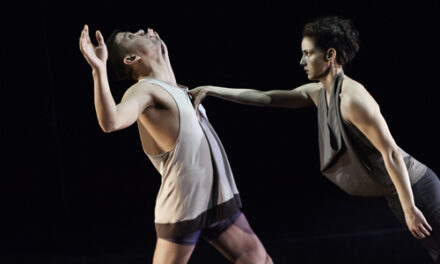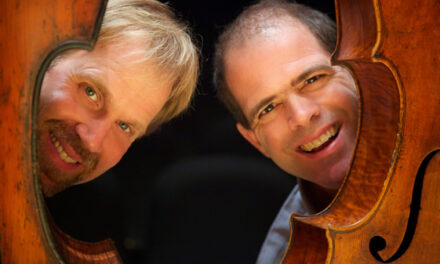On the night of a full moon, a comet passing by, and an eclipse, the heavy hitting team of Laurie Anderson and Philip Glass shared the enormous stage of Memorial Hall. Carolina Performing Arts’ 10-day Glass at 80 festival was a highlight in the UNC’s place in the fabric of North Carolina arts and also as national presenters. The programs and outreach events were not only met with high box office returns, but also overwhelming audience reception. To conclude the 10-day festival that included heavy-hitters such as Dennis Russell Davies, Timo Andres, and the Kronos Quartet, CPA topped it off with Anderson and Glass himself performing together in the first half of the concert.*
Friends and collaborators for most of their careers, both artists were revelatory in their respective fields, often mixing one another’s mediums. Anderson creates immersive emotional experiences through her minimalist approach of combining poetry, music, and visuals in performance. Her film Heart of a Dog is a worthy introduction for those unfamiliar with her work. So when we had an artist who creates performance from poetry and music join a composer whose collaborations have relied heavily on texts, the result was nothing short of a miracle. Rarely announcing what was coming next, the first half allowed for seemingly spontaneous ruminations on death, the natural world, and childhood. (Anderson recited a humorous recollection of a correspondence with Jack Kennedy when she ran for middle school student council.) The majority of the concert felt improvised, with Anderson often initiating an electronic ambience that accompanied the words and music. The two were joined by Philip Glass Ensemble member Mick Rossi who played drums on an extended version of Glass’ Etude No. 10.
The poetry spanned artists such as Alan Ginsberg and Anderson’s late husband Lou Reed, both poets’ voices heard on pre-recorded tapes. When Glass and Anderson took turns reading – as they went go back and forth in the final 15-minute piece – their tone was one not of reflection but matter of fact. Even a bit detached. The reflections on life, death, and other ethereal matters did not carry worry or uncertainty for them. It was as though they were saying these things are the way they are, so why must we spend the majority of our lives thinking and worrying about what is to come. There was so much here already to observe and hear.
The second half of the evening was a concert version of Glass’ opera Monsters of Grace, a song cycle based on the writings of Rumi and sponsored by the Roshan Cultural Heritage Institute as part of CPA’s year-long Sacred/Secular: Sufi Journey series. The opera was performed by the Philip Glass Ensemble, conducted by Michael Reisman, and included Glass on keyboards with four regular PGE singers.
The overture was delayed about five minutes due to Resiman’s keyboard patches and monitor acting up. Once started, the baritone’s first lines were spoken: “Even if our instrument breaks, there is much to listen to.” Chuckles emitted from the audience.
The quartet of singers shone in their respective solos and balance of the difficult harmonies in the ensemble sections. Baritones Gregory Purnhagen and Peter Stewart are sensitive singers. Marie Mascari and a refreshingly expressive Tara Hugo gave moving performances, especially during one humorous selection called “Like This” and the “Moon” song. The quartet demonstrated knowledge and appreciation for singing Glass’s music, making the task of navigating the challenging vocal lines effortless.
As with many Glass operas, the composer seeks to discover not so much the motivations of people’s actions, but rather to examine their place in time and space. The central figures of his operas are generally historical figures (Ghandi, Galileo, Kepler, Einstein) and all are meditative in sound and style. Rumi’s words perfectly fit Glass’ music; several selections – one such about an aptly appropriate full moon – inspired Glass. Other sections of selected movements are careful and cautious in their experimentation but are nevertheless still worth hearing. A sustained Glass song cycle may divide audiences, yet hearing it live and performed by the very ensemble that bears his name, one can’t help but revel in the honor of sitting in the audience and hearing this.
Glass’ music is both cerebral and emotional. Often the music must go through the head of the listener for several minutes before connecting – some attribute that to the number of notes in one bar of music, others that he isn’t complacent with simple four-bar phrases. He is, in short, a genius and a master of understanding how music is heard, digested, and appreciated. This conclusion of the festival isn’t the end of Glass – he continues to live through the very performers who played at the festival and the audiences who have experienced his music live. What an honor to be in the room where it happens.
*A Glass concert by the UNC SO was postponed due to weather until March 5. See our calendar for details.












